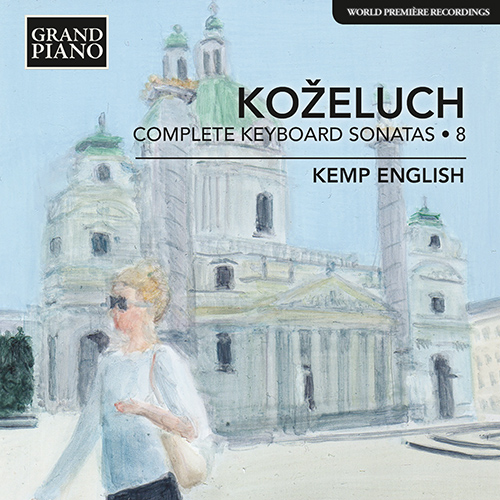KOŽELUCH, L.: Keyboard Sonatas (Complete), Vol. 8 (K. English)
For forty years the Bohemian composer Leopold Koželuch produced a sequence of keyboard sonatas that some commentators preferred to those of his great contemporary, Mozart. The four sonatas on Volume 8 exemplify Koželuch’s vitality and expressive breadth. Sonatas Nos. 31 and 32, published in the year of Mozart’s death, are notable for their exploration of new technical devices and a daring harmonic palette worthy of Clementi.
This recording was made on a period instrument: Fortepiano by Paul Downie (NZ), after Anton Walter (c. 1795)

Kemp English is one of New Zealand’s leading concert performers. Much in demand as a solo organist, collaborative pianist, and specialist fortepiano exponent, he relishes the opportunity to work in a diverse array of styles and periods. His solo CDs Schwammerl, Kemp English at the Fortepiano and the Stormin’ Norma trilogy, showcasing the magnificent Dunedin Town Hall organ, have all met with widespread critical acclaim at home and abroad and feature regularly on Radio New Zealand, the ABC, BBC Radio, Classic FM UK and USA radio networks. His collaborative discs with violin duo partner Robin Wilson (Head of Violin at the Australian National Academy of Music) have been equally well received. He enjoyed a distinguished studentship at the Royal Academy of Music in London and later completed a Master of Arts degree in music performance at the University of York. In 2001 he was elected an Associate of the Royal Academy of Music – an honour recognising former students of the Academy who have achieved distinction in the profession. Four years later, after more than a decade as Executant Lecturer in fortepiano, organ and harpsichord performance at the university of Otago, he made the decision to free-lance and concentrate on his increasingly hectic performing and recording career. He continues to tour Australasia and Europe as both a solo and collaborative performer.
In 2010 Kemp English became part of the proof reading team for Christopher Hogwood’s new Bärenreiter edition of the Koželuch keyboard sonatas. This collaborative work with the late Chris Hogwood and his musical assistant Ryan Mark gave him exclusive access to pre-publication copies of all the sonatas in the series. As a result, he was able to complete the world première recording of the complete cycle of Koželuch’s solo keyboard sonatas in April 2013. This groundbreaking set of recordings is now complete and released on Grand Piano. In 2013 the University of Adelaide awarded Kemp English a PhD (with a Dean’s Commendation for Doctoral Thesis Excellence) for this pioneering recording work and associated historically informed Koželuch scholarship.

Leopold Koželuch was an esteemed contemporary of Mozart, and in many circles considered the finer composer. He was an early champion of the fortepiano and his Keyboard Sonatas are a treasure trove of late eighteenth-century Viennese keyboard style, including perfect examples of the form and foreshadowing Beethoven and Schubert.
Leopold Koželuch was born in Velvary, northwest of Prague in 1747. He was christened Jan Antonín but changed his name to Leopold to avoid confusion with his older cousin, also a musician, of the same name. His Czech family name of Koželuh (‘tanner’) became Koželuch to make it more manageable in German. Cousin Jan Antonín became one of Leopold’s earliest teachers, along with František Xavier Dušek, a noted Czech keyboard player and composer. In 1778, after some success as a composer of ballet music and having relinquished law studies, Koželuch moved to Vienna, Europe’s thriving musical centre and, as Mozart was to remark, ‘the land of the Clavier’. Koželuch soon established a fine reputation as a fortepianist, composer and teacher. By 1781 he was regarded so highly that the Archbishop of Salzburg offered him Mozart’s former post as court organist. He declined, later stating to a friend ‘the Archbishop’s conduct toward Mozart deterred me more than anything; for if he could let such a man as that leave him, what treatment should I have been likely to meet with?’ In 1784 Koželuch founded his own publishing firm (Musikalisches Magazin) in the same year as Hoffmeister and slightly behind Artaria (1778) and Torricella (1781). This was to provide an ideal vehicle for the publication of his compositions. He also forged valuable and profitable links with European publishers, notably in Paris (Boyer, Leduc and Sieber), London (Birchall, Longman and Bland), and Amsterdam. In 1792 he succeeded Mozart as Kammer Kapellmeister and Hofmusik Compositor to Emperor Franz II and remained in that post until his death in 1818. After 1802 Koželuch became associated with George Thomson, a man with an insatiable appetite for Scottish, Irish and Welsh folk-song arrangements (other contributors included Pleyel, Haydn, Beethoven and Hummel). This lucrative work and his court duties kept him busy for the remainder of his working life.































